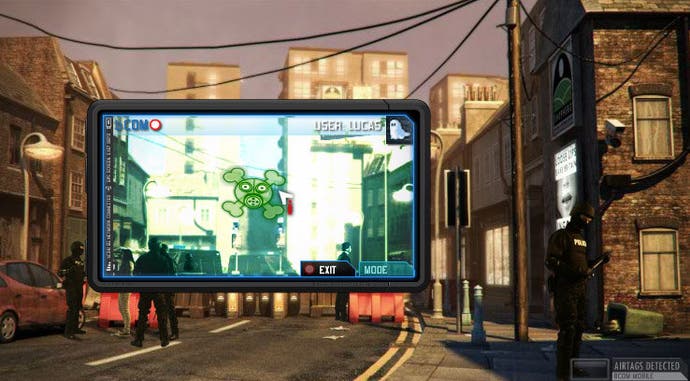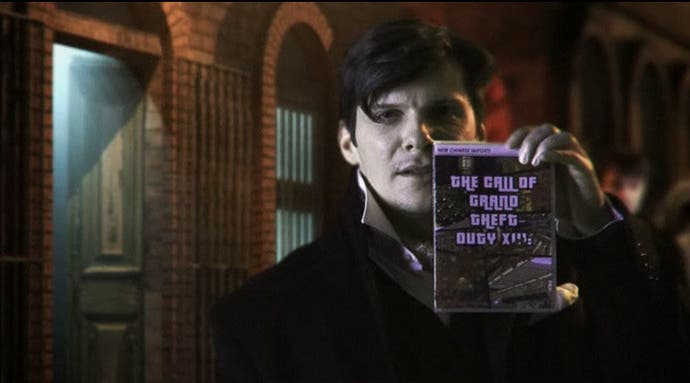The Curfew
The game is free. Are you?
Progress is hardly taxing, made difficult more because the workings of the game aren't always clearly signposted (at least in this beta version). But a smattering of arcade sections ensure that it's more than just an interactive sermon. In the first character chapter - the only one available right now - you get to play a government-approved shooting gallery game, wash the windows of an elderly dissident, and take out a CCTV camera Beano-style using a catapult.
These interludes are technically clunky, but it's easy to appreciate the effort they represent. More successful is a chase sequence which finds you blindly picking directions to escape from the police, before what feels like a completely unfair twist leads into a neat punchline.
The video-heavy gameplay also has its advantages and disadvantages. On the one hand it summons up unwelcome memories of the mid-nineties fascination with full-motion video, and the resulting mix of real actors and locations with CG embellishment can feel stilted and stagey. On the other, it successfully conjures up a claustrophobic atmosphere and the decaying world it creates feels well-conceived and believable. The conceit of trapping the characters in the safe house overnight is dramatically satisfying as well, giving proceedings the feel of an experimental piece of theatre.

The acting varies wildly, though, with some ropey performances standing out all the more alongside the ones that manage to convincingly sell the fiction. Rabble-rousing political comedian Mark Thomas cameos as a bland yet sinister government-approved newsreader, but the bizarre stand-out is former EastEnders star Nigel Harman, who dresses like Raffles the gentleman thief and camps it up something rotten as a dealer of unlicensed videogames. Sadly, the game he's selling is The Call of Grand Theft Duty XIII: Hyperdeath Electrofight, a sledgehammer parody that will elicit a painful groan from most gamers.
While the gameplay sometimes feels a tad perfunctory, it's more absorbing than most web-based games and the high production values certainly help in that regard. Where The Curfew struggles most, at least in this early spin through the first quarter of its promised content, is in the message it tries to convey.
Thankfully, it doesn't browbeat the player with too many political diatribes, preferring instead to let the mood of dry social satire do the heavy lifting. A couple of clunkers - "Smile, you're on camera, they say. Meanwhile, liberty weeps" - slip through, but The Curfew is always more interested in advancing the game than the manifesto.
It's just not entirely clear what message is being conveyed. It's apparently inspired by the fact that curfews are already implemented in the UK, with the police able to send under-16s home after 9pm, but that's a far cry from the crushing fascist boot portrayed in the game, where second-class citizens have to queue separately for their fast food while automated police sentries buzz the streets and armed cops seal off residential roads on a whim.

If this enjoyable but exaggerated dystopian fiction is supposed to make us think about the world today, it does so at the risk of falling into the same slippery-slope approach to debate used by those who squeal that if we let men marry men, then what's to stop us all marrying tables and dogs? The themes are well-intentioned and certainly important, but it also feels too far removed from the actual issues of today to really work as an educational tool.
A less fantastical grounding for the tale might have made it a more compelling work of activism, but likely at the cost of an interesting story and game-world. So-called serious games often feel awkwardly stretched between the entertainment demands of gameplay and the intellectual demands of the Sunday supplement journalists who end up covering them, and if The Curfew wobbles along that line, it's only because it dares to walk it with more confidence than its peers. Arguably of more interest to students of game design than those looking for a lunchbreak time waster, it at least feels like an actual game, and not just a pamphlet controlled with the cursor keys.
Currently in a beta trial phase, with some missing text and a couple of Flash hiccups, The Curfew is nevertheless shaping up as an interesting, and often entertaining, example of how gaming is pushing into new territory. You can try it for yourself at The Curfew website.
